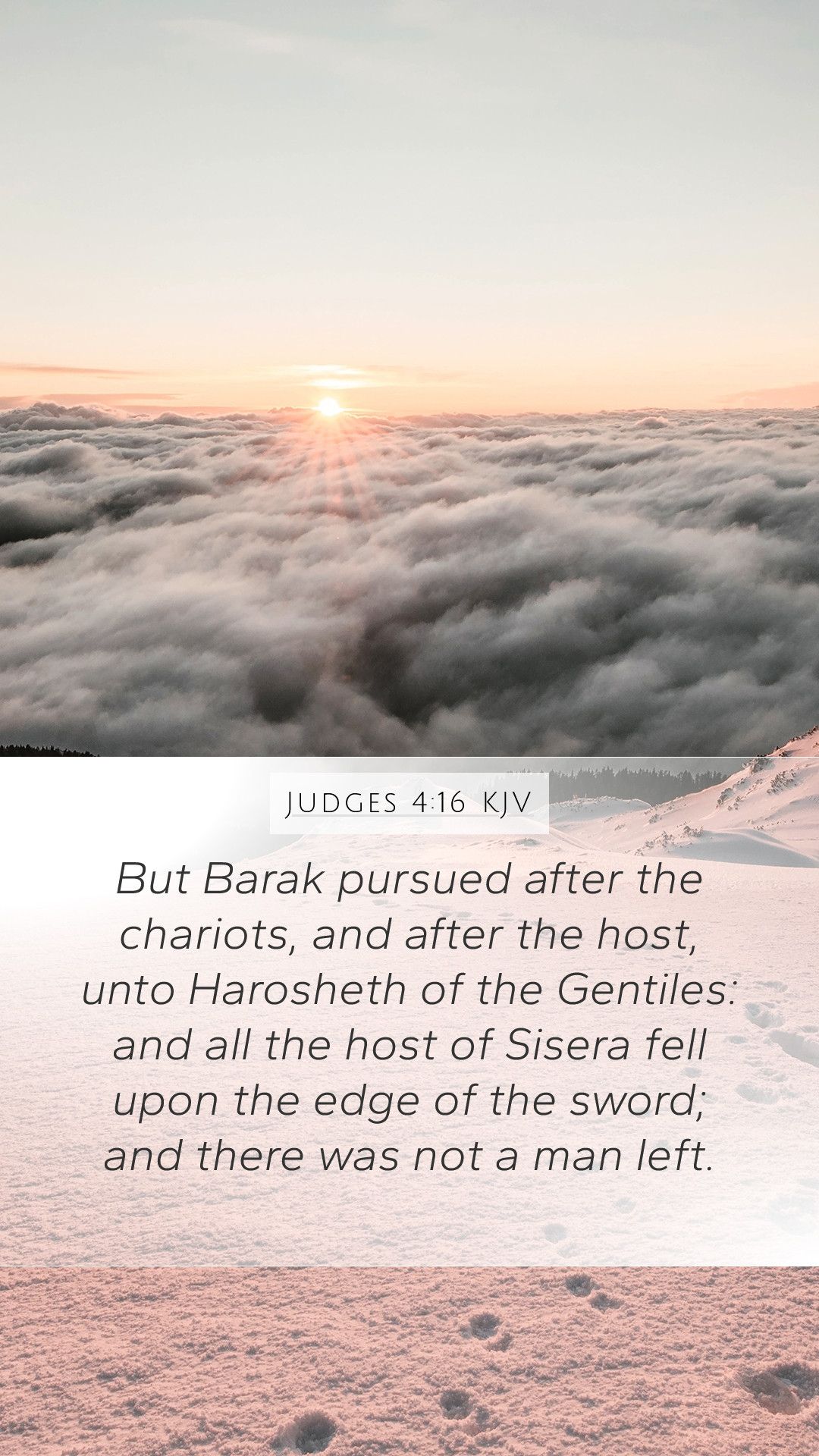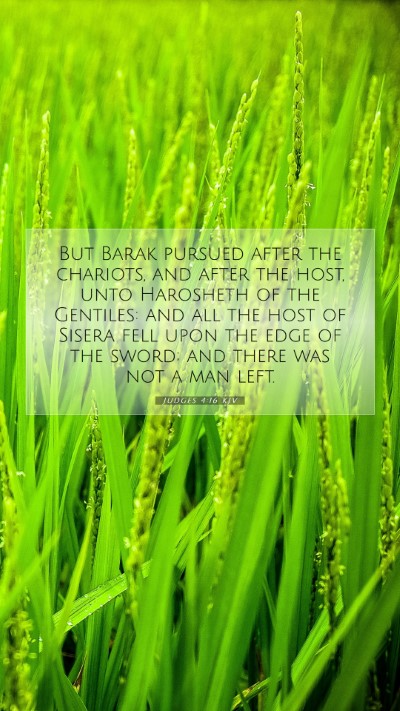Old Testament
Genesis Exodus Leviticus Numbers Deuteronomy Joshua Judges Ruth 1 Samuel 2 Samuel 1 Kings 2 Kings 1 Chronicles 2 Chronicles Ezra Nehemiah Esther Job Psalms Proverbs Ecclesiastes Song of Solomon Isaiah Jeremiah Lamentations Ezekiel Daniel Hosea Joel Amos Obadiah Jonah Micah Nahum Habakkuk Zephaniah Haggai Zechariah MalachiJudges 4:16 Meaning
What is the meaning of Judges 4:16?
But Barak pursued after the chariots, and after the host, unto Harosheth of the Gentiles: and all the host of Sisera fell upon the edge of the sword; and there was not a man left.
Judges 4:16 Bible Verse Meaning
Bible Verse Meaning: Judges 4:16
Judges 4:16 states, “But Barak pursued after the chariots, and after the host, unto Harosheth of the Gentiles: and all the host of Sisera fell upon the edge of the sword; and there was not a man left.”
This verse marks a pivotal moment in the narrative of Judges, highlighting the victory of the Israelites over their oppressors, specifically Sisera and his army. The historical context is crucial for understanding the significance of this event. Barak, the military leader, obeys the command of Deborah, the prophetess, and leads the charge against Sisera.
Understanding the Passage
The passage demonstrates several key themes:
- Divine Intervention: The battle signifies the active involvement of God in Israel's affairs, providing deliverance in response to their cries for help.
- Obedience to God: Barak’s willingness to follow Deborah's leadership exemplifies the importance of obedience in achieving God’s purposes.
- Courage in Battle: The pursuit of Sisera's chariots shows Barak's bravery and determination, reflective of faith in God’s empowering presence.
- Judgment Against Evil: The complete destruction of Sisera's army symbolizes God's judgment against those who oppress His people.
Bible Verse Commentary
According to Matthew Henry, this passage serves as a reflection of God's power and the effectiveness of faithful leadership. He points out that the destruction of Sisera’s army is not just a military victory; it signifies a spiritual conquest of sin and oppression.
Adam Clarke elaborates on the significance of the geographical location mentioned, Harosheth of the Gentiles, symbolizing a place of foreign influence that Israel was able to conquer. He notes that the verse suggests a thorough and decisive victory for the Israelites.
Albert Barnes emphasizes the completeness of the destruction, noting that "there was not a man left" illustrates not just physical defeat but the totality of God's triumph over evil forces. This represents the fulfillment of God's promises to protect and deliver His people.
Application of the Verse
For modern readers, Judges 4:16 can be seen as an encouragement to trust in God’s plan during times of strife. Here are some applications:
- God fights our battles: Believers can take comfort that they are not alone in their struggles; divine support is available.
- Leadership matters: The verse underlines the importance of righteous leaders who follow God’s direction.
- Victory through faith: The narrative encourages faith and action, asserting that God honors courageous steps taken in His name.
Related Bible Cross References
- Judges 4:9 - The call to action made by Deborah to Barak.
- Judges 5:20 - The mention of angels aiding in the battle.
- 1 Samuel 17:47 - God's battle against the foes of His people, as seen with David and Goliath.
Biblical Exegesis
The examination of this verse reveals much about the socio-political landscape of Israel at that time, the cycles of sin and redemption that dominate the Book of Judges, and God’s unfailing commitment to His people. Each element of the narrative illustrates how obedience and faith can lead to miraculous deliverance.
Understanding such passages requires Bible study tools, as they help in grasping the historical context and theological truths embedded within the scripture. Using Bible study resources ensures a richer comprehension and application in personal faith journeys.
Conclusion
Judges 4:16 not only recounts a military victory but stands as a testament to any believer's struggle against oppression and the importance of divine assistance. Whether through online Bible study, Bible study guides, or Bible study lessons, this verse challenges readers to delve deeper into their understanding of Scripture, revealing how ancient narratives still resonate with contemporary faith experiences.


